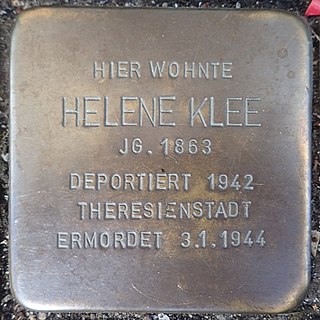Related Research Articles
Banach is a Jewish surname of Ashkenazi origin believed to stem from the translation of the phrase "son of man", combining the Hebrew word ben and Arameic nasha ("man"). Worth mentioning is how the Sephardic surname Banache presents a variant with the -ache alternative ultima, common in other Jewish surnames such as Farache, Ayache, Nakache, Harache or Marrache.
Yaron is a Hebrew name meaning "is full of joy", "will be full of joy", or "to shout, to sing". It is common in Israel as both a male first name and a surname. Its English-language equivalent is Jaron.
Auspitz is a Jewish surname. Notable people with this name include:
Abramsky or Abramski is a variation of a patronymic surname meaning "son of Abram", the Biblical figure. The name is most prevalent among Jews. Notable people with the surname include:
Abramov (male) and Abramova (female) are old Russian surnames originating around the 16th century. Variations of the former calendar name Avraam. The surname was common among all social estates and covered the whole territory of the Russian Empire. Sometimes it derived from patronymic.
Alterman is a surname of German and also Yiddish origin, meaning "old man". Notable people of the surname include the following:
Alpert is a variation of the Jewish surname Heilprin, and may refer to:
Kamm, Kamp is a German or Jewish surname, from the German word for "comb", most likely a metonymic occupational surname for a comb maker, or a wool comber.
Kass is a surname. It originated in several different ways, including as a nickname in former eastern territories of Germany from the Czech word kos, from the Estonian word kass meaning cat, from the given name Gazo, as an Ashkenazi Jewish surname from the given name Casriel, and possibly as an Americanized spelling of Káš or Kaše. The 2010 United States census found 3,796 people with the surname Kass, making it the 8,655th-most-common surname in the country, compared to 3,523 people (8,599th-most-common) in the 2000 census. In both US censuses, more than nine-tenths of the bearers of the surname identified as non-Hispanic white.
Abramowicz, Abramovich, Abramowitz, and Abramovitz are variant spellings of a name meaning "son of Abraham" among Slavic language speaking peoples; it is a common surname amongst Ashkenazi Jews, for whom it is commonly Hebraized to Ben-Avraham (בן-אברהם) upon immigration to Israel. It was also one of the many surnames of which were historically given by the returning Crusaders to their children, in recognition of their father's visit to the Middle East.
Abutbul is a surname. People with this surname include:
Adelstein is a Jewish surname meaning "precious stone".
Heuberger is a topographic surname of German and Ashkenazi Jewish origin, deriving from the region of Heuberg in Suebia. It is composed of the Middle High German "höu" and "berg" meaning "hay mountain". Notable people with the surname Heuberger include:
Meltzer is a surname of German or Yiddish origin, meaning "malt or beer maker".
Agmon is a Jewish surname, Hebrew for bulrush. Notable people with the surname include:

Klee is a German and Ashkenazi Jewish surname. Variations include Kleefeld, Kleeblatt, Kleegman, Kleiman, Kleeman and Kleeberg. In German, it means "clover" and is possibly a toponymic surname like Feldman.
Admoni is a Jewish surname, which means "red" or "ruddy" in Hebrew. Notable people with the surname include:
Gan is a surname. It may be a Latin-alphabet spelling of four different Chinese surnames, a Korean surname, and a surname in other cultures.
Aizer is a surname. Notable people with the surname include:
Yishai is a Hebrew given name and surname. It is the origin of the English given name Jesse, and is the original Hebrew name of Jesse father of David. Variant spellings include Yishay, Ishay, Yshai, and Yeshay. There is also a derived patronymic surname Ben-Yishai.
References
- ↑ Guggenheimer, Heinrich Walter; Guggenheimer, Eva Auguste Horowitz (1992). Jewish Family Names and Their Origins: An Etymological Dictionary. Hoboken, N.J: KTAV Publishing House. p. 40. ISBN 978-0-88125-297-2. OCLC 25093664 . Retrieved 7 April 2019.